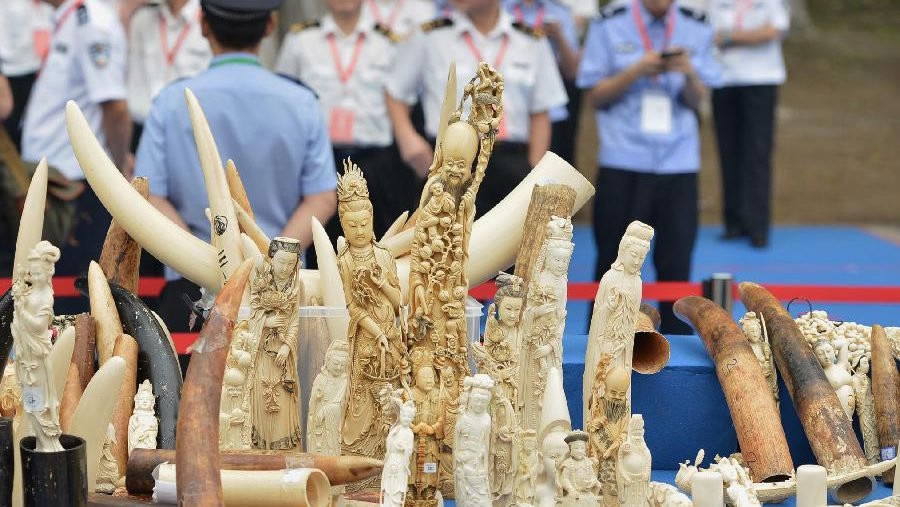
Tech & Sci
14:17, 21-Jan-2018
Gabon busts illegal ivory network after China's ban
Alok Gupta

Barely three weeks after China banned the international and domestic trade of ivory, Gabon in a major crackdown busted an illegal ivory trafficking network.
According to the government of Gabon and WildAid, Abdoulaye Mohamoud Ibrahim, a Chadian national at the center of the elephant poaching network, is suspected to have trafficked 600 tusks during 2017 alone. He has been wanted by Gabonese authorities for wildlife crimes since 2015.
Interpol and French authorities had collaborated and launched Operation Nzok – which means elephant in the local language – in 2015 to investigate and arrest the ivory smugglers.
“Gabon and other African countries are cracking down on the corrupt and criminal activities on the supply side, while China and Vietnam are hitting the demand with strict new laws. As ivory prices tumble it’s the ideal time to dismantle this organized crime,” said WildAid CEO Peter Knights.
Read More: China's six major environmental decisions
Gabon is home to an estimated 50,000 of Africa’s 100,000 imperiled African forest elephants. The government is spending millions to protect these elephants from poaching.
The country has deployed trained wildlife rangers to monitor the forests and movements of poachers. Authorities have also made a substantial deployment of military forces, sniffer dogs, camera traps, drones and a helicopter.
“I can tell you today, in no uncertain terms, that we are fighting a war against illegal natural resource extraction. If we lose, we risk losing control of our nation and of our destiny,” Gabon’s President Ali Bongo said in a press release.
Elephant populations in parts of Cameroon, Republic of Congo, Central African Republic and Gabon declined by a whopping 66 percent between 2008 and 2016 due to poaching.
Despite major surveillance operations, Central and West African elephants are facing a significant threat from poachers. Currently, only poaching of East African savanna elephants is declining.

The eight-member gang led by kingpin Abdoulaye Mohamoud Ibrahim has been busted in Gabon. /WildAid Photo
The eight-member gang led by kingpin Abdoulaye Mohamoud Ibrahim has been busted in Gabon. /WildAid Photo
“We face organized poaching gangs that are ever more violent, shooting on sight today when they encounter our patrols,” said Gabonese National Parks Agency director, Professor Lee White.
“Organized criminal networks, some of which are linked to Boko Haram terrorists, are hunting down the forest elephants in a crisis that has seen us lose over 80 percent of all forest elephants in Central Africa outside Gabon and Northern Congo,” he added.
White said 70 percent of the elephants in the Minkebe National Park, on the Cameroon border in northeast Gabon, where pressure from poachers is highest, have been lost.
In places like Loango and Wonga Wongué, poaching is controlled and wild elephant populations are rebounding.
Kenya is also witnessing similar trends in elephant population rebound. Poachers killed 390 elephants in 2013, but the number came down to 46 last year, according to the Kenya Wildlife Service
“2018 can be a turning point for forest elephants, which have suffered so severely over the past decade. Law enforcement is increasing across Africa and Asia, and China has closed the world’s biggest ivory market,” Knights said.
In recent years, many countries have banned the domestic trade of ivory. However, Japan's inability to control the ivory trade has become a cause of worry.
China’s ban has led to a major slump in ivory prices globally. “Ivory prices in Asia have fallen from 2,100 US dollars per kilogram to around 700 US dollars in reaction to the sales bans and public awareness campaigns,” WildAid maintained.

SITEMAP
Copyright © 2018 CGTN. Beijing ICP prepared NO.16065310-3
Copyright © 2018 CGTN. Beijing ICP prepared NO.16065310-3